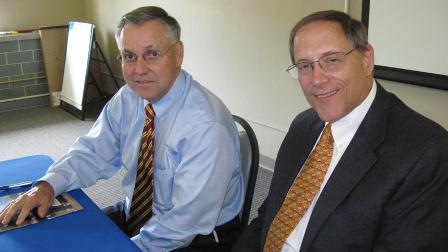WILLMAR—U of M, MinnWest Tech Campus talk renewed commitment of collaboration.
A renewed commitment of collaboration between the University of Minnesota and the MinnWest Technology Campus in Willmar could help both entities achieve their goals and missions, according to Dr. Brian Herman, vice president for research at the University of Minnesota.
Herman spent Monday touring the MinnWest Technology Campus with University Regent Vice President Dean Johnson, of Willmar.
That tour included the University’s Mid-Central Research and Outreach Center—often referred to as MCROC—that houses a regional Extension office and the University’s avian research laboratory. The initial focus of the research and outreach center, which opened last year, has changed since it was first conceived as a business training location. With the Extension office, avian laboratory and a reinforced partnership with the MinnWest campus, Herman said there will be “greater synergies going forward.”
A public discussion on how to fine-tune that public-private partnership with the University will be held Sept. 30 in Willmar, according to Johnson.
Johnson said Monday that there was a “very fruitful, wonderful, honest discussion” about the relationship between the different entities that helped “clarify” the University’s role on the campus, including making the MCROC the “new gateway to the University of Minnesota.”
Johnson said the research and outreach center will serve as a “clearinghouse of information and ideas” for the MinnWest Technology Campus businesses, which will link private enterprise with the University’s resources that could result in jobs, business growth and an economic boost to the community.
“I began to feel and believe the walls are coming down between the University and the MinnWest Technology campus and the businesses,” said Johnson as Monday’s visit wound down.
“We took a second look today and have agreed some things need to change and will change in a cooperative effort,” said Johnson, calling this a “healthy” discussion between the two entities.
Herman said there was discussion about partnerships between the poultry-based businesses on the campus, such as Nova-Tech Engineering, and the University’s poultry research laboratory. He said it’s possible veterinary students in the University’s poultry program could have a rotation in Willmar.
The two-way relationship could also include businesses accessing University training and University students getting internships—and potential jobs in the future—at MinnWest businesses.
Jim Sieben, vice president and general manager at Nova-Tech Engineering, said being on the MinnWest campus has helped their business recruit talented employees but they still struggle to find employees trained in chemical, technical and software engineering.
As a land-grant University, Herman said the role of the University is to “provide the talent pool and the expertise to keep those industries successful, growing and thriving.”
As plans progress, Herman said there needs to be “reasonable” cost-sharing for the programs that allows both sides to “see the value in investing in the combined activity.”
Herman, a professor of cellular and structural biology and a Harvard Medical School graduate, has only been at the University of Minnesota about six months. This was his first time in Willmar.
He said he was “very impressed” with the MinnWest campus.
“They’ve built a tremendous activity out here and I expect it will be gaining more and more notoriety, not only based upon the partnership with the University but based upon the expertise of the people and companies that exist here,” he said.

